Module 5 Museums 全模块词汇语法复习课件(共32张PPT)
文档属性
| 名称 | Module 5 Museums 全模块词汇语法复习课件(共32张PPT) |
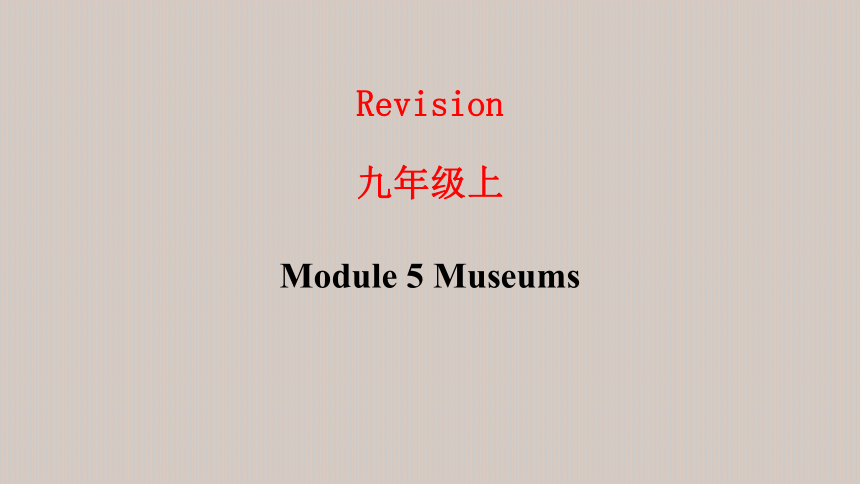
|
|
| 格式 | pptx | ||
| 文件大小 | 1.7MB | ||
| 资源类型 | 教案 | ||
| 版本资源 | 外研版 | ||
| 科目 | 英语 | ||
| 更新时间 | 2022-10-07 09:40:34 | ||
图片预览

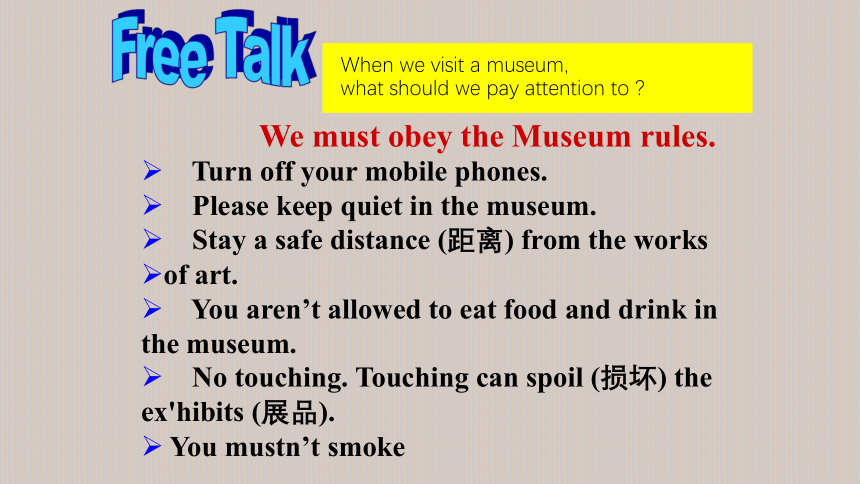
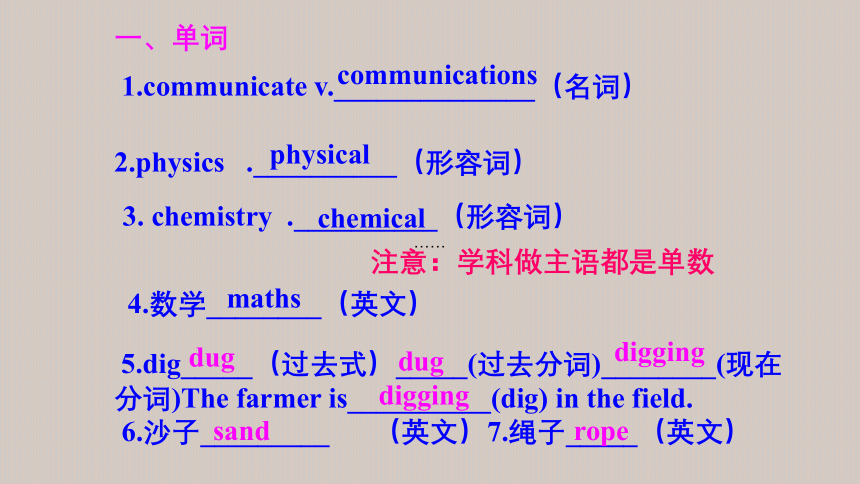
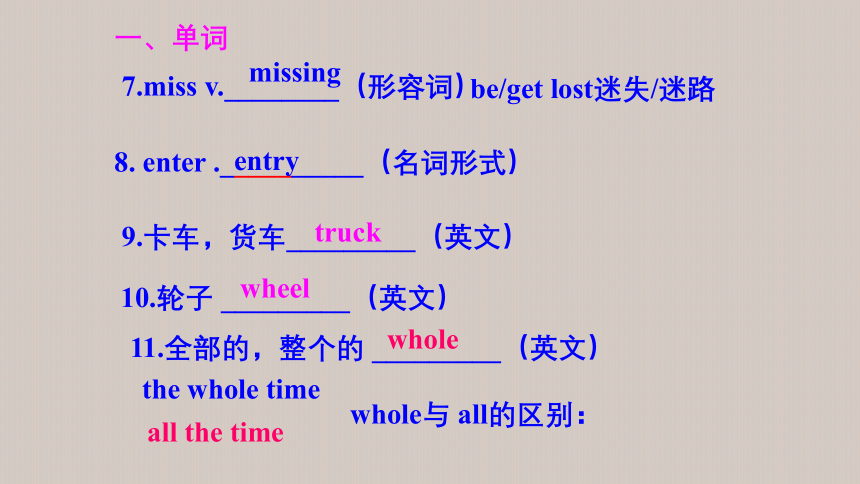
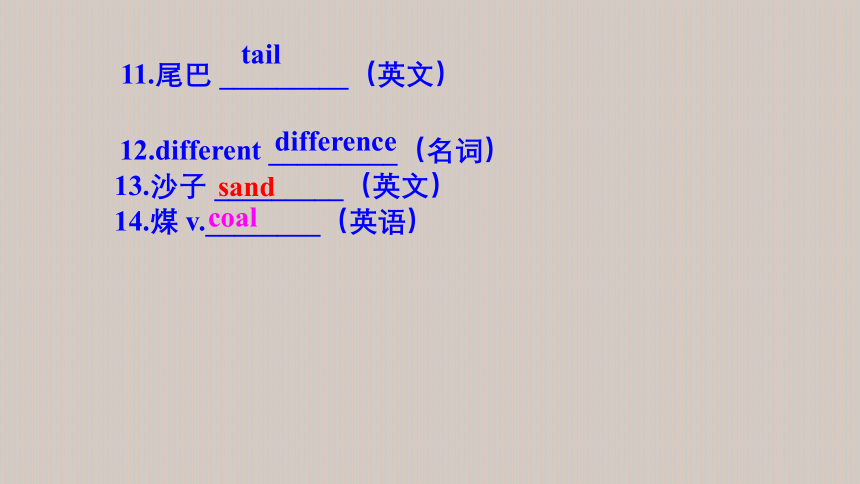
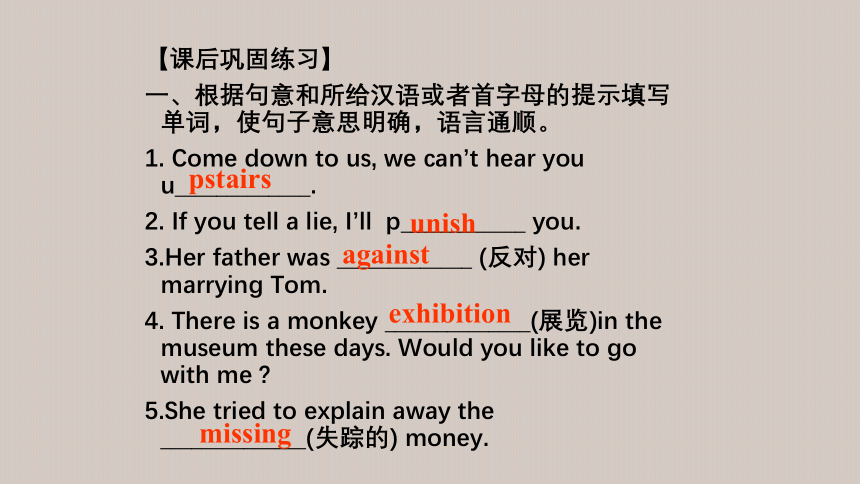
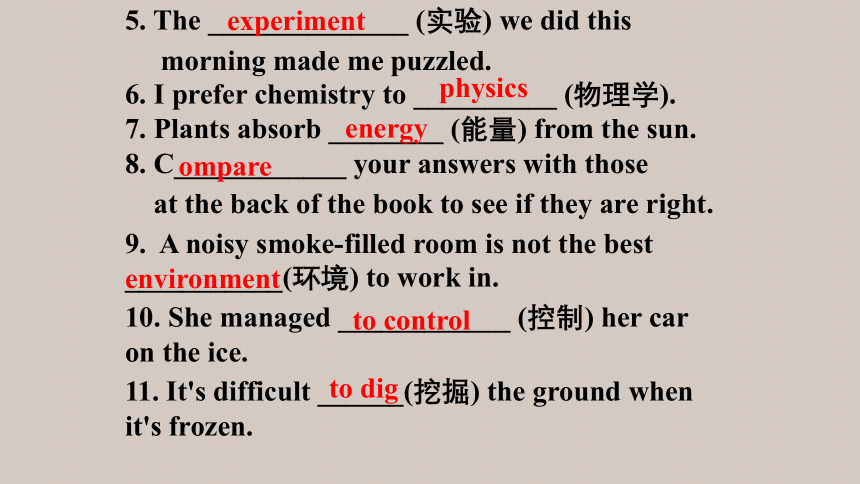
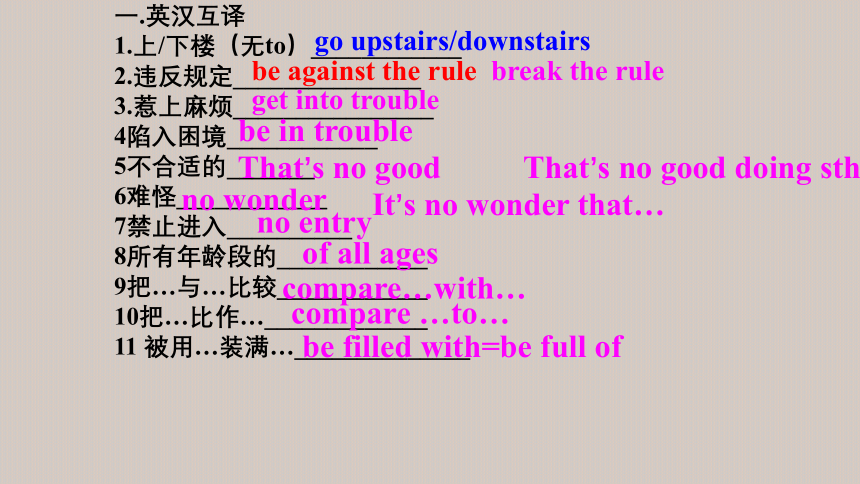
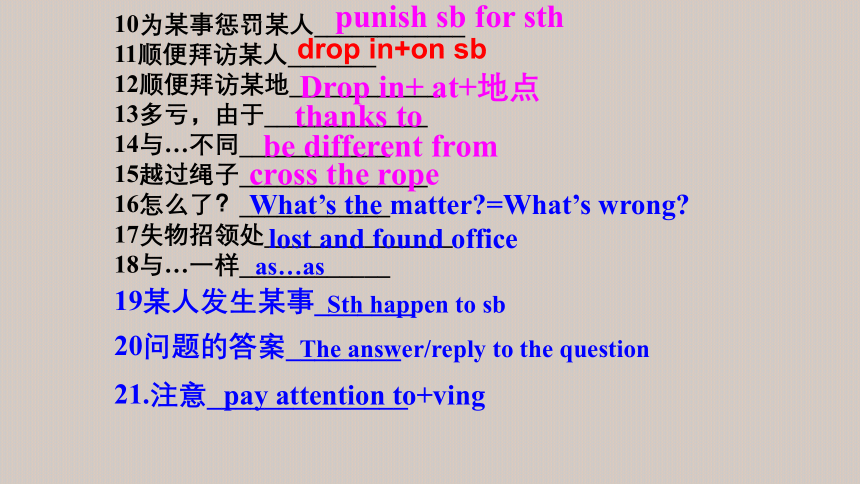
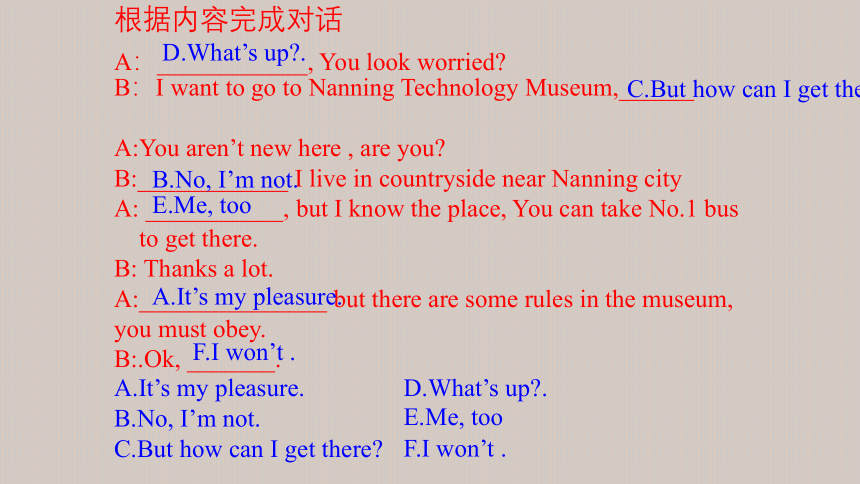

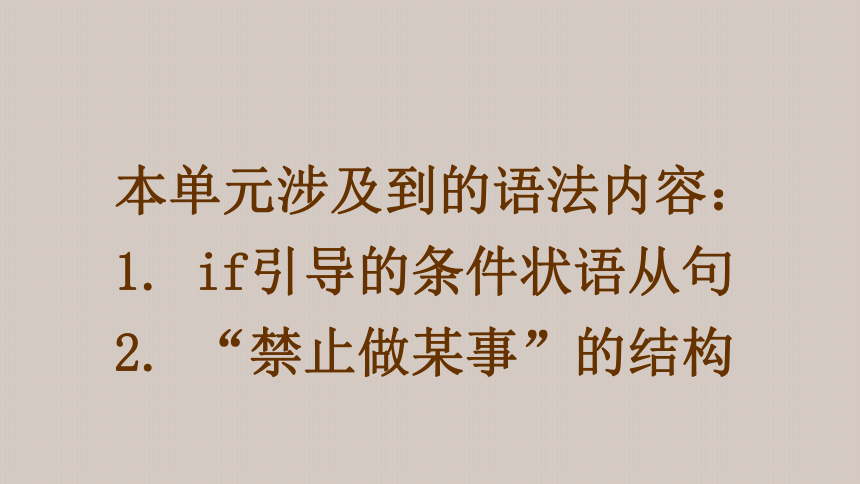
文档简介
(共32张PPT)
Revision
九年级上
Module 5 Museums
When we visit a museum,
what should we pay attention to
Free Talk
We must obey the Museum rules.
Turn off your mobile phones.
Please keep quiet in the museum.
Stay a safe distance (距离) from the works
of art.
You aren’t allowed to eat food and drink in the museum.
No touching. Touching can spoil (损坏) the ex'hibits (展品).
You mustn’t smoke
一、单词
1.communicate v.______________(名词)
2.physics .__________(形容词)
physical
3. chemistry .__________(形容词)
communications
4.数学________(英文)
chemical
5.dig_____(过去式)_____(过去分词)________(现在分词)The farmer is__________(dig) in the field.
……
maths
dug
6.沙子_________ (英文)7.绳子_____(英文)
sand
注意:学科做主语都是单数
dug
rope
digging
digging
一、单词
7.miss v.________(形容词)
entry
8. enter .__________(名词形式)
missing
9.卡车,货车_________(英文)
10.轮子 _________(英文)
truck
wheel
11.全部的,整个的 _________(英文)
whole
the whole time
all the time
whole与 all的区别:
be/get lost迷失/迷路
11.尾巴 _________(英文)
tail
12.different _________(名词)
difference
13.沙子 _________(英文)
sand
14.煤 v.________(英语)
coal
【课后巩固练习】
一、根据句意和所给汉语或者首字母的提示填写单词,使句子意思明确,语言通顺。
1. Come down to us, we can’t hear you u_____________.
2. If you tell a lie, I’ll p____________ you.
3.Her father was _____________ (反对) her marrying Tom.
4. There is a monkey ______________(展览)in the museum these days. Would you like to go with me
5.She tried to explain away the ______________(失踪的) money.
pstairs
unish
against
exhibition
missing
5. The ______________ (实验) we did this
morning made me puzzled.
6. I prefer chemistry to __________ (物理学).
7. Plants absorb ________ (能量) from the sun.
8. C____________ your answers with those
at the back of the book to see if they are right.
9. A noisy smoke-filled room is not the best ___________(环境) to work in.
10. She managed ____________ (控制) her car on the ice.
11. It's difficult ______(挖掘) the ground when it's frozen.
experiment
physics
energy
ompare
environment
to control
to dig
一.英汉互译
1.上/下楼(无to)____________
2.违反规定_______________
3.惹上麻烦________________
4陷入困境____________
5不合适的_______
6难怪____________
7禁止进入__________
8所有年龄段的____________
9把…与…比较____________
10把…比作…_____________
11 被用…装满…______________
be in trouble
go upstairs/downstairs
be against the rule
get into trouble
That’s no good
no wonder
no entry
of all ages
compare…with…
compare …to…
be filled with=be full of
break the rule
That’s no good doing sth
It’s no wonder that…
10为某事惩罚某人____________
11顺便拜访某人_______
12顺便拜访某地____________
13多亏,由于_____________
14与…不同____________
15越过绳子_______________
16怎么了?____________
17失物招领处_______________
18与…一样____________
punish sb for sth
Drop in+ at+地点
thanks to
be different from
cross the rope
What’s the matter =What’s wrong
lost and found office
as…as
19某人发生某事_______
20问题的答案________
drop in+on sb
Sth happen to sb
The answer/reply to the question
21.注意______________
pay attention to+ving
根据内容完成对话
A:____________, You look worried
B:I want to go to Nanning Technology Museum,______
A:You aren’t new here , are you
B:____________ I live in countryside near Nanning city
A: ___________, but I know the place, You can take No.1 bus
to get there.
B: Thanks a lot.
A:_______________ but there are some rules in the museum, you must obey.
B:.Ok, _______.
C.But how can I get there
B.No, I’m not.
E.Me, too
D.What’s up .
A.It’s my pleasure.
F.I won’t .
A.It’s my pleasure.
B.No, I’m not.
C.But how can I get there
D.What’s up .
E.Me, too
F.I won’t .
5
P35
Complete the passage with the words in the box.
Lingling and Betty needed some information for their projects, so they wanted to go (1) ________ to the Animal Room, but Daming got into trouble at the monkey (2) _________. Daming broke the (3) ________ by shouting and trying to cross the (4) ________ when he planned to see a monkey with a long (5) _______. Then they discovered that Lingling’s mobile phone was (6) _______. The guard told them to go (7) __________ to the lost and found office. Lingling has to find her phone, or her mother will (8) ________ her.
downstairs exhibition missing punish rope rules tail upstairs
upstairs
exhibition
rules
rope
tail
missing
downstairs
punish
Task 4
本单元涉及到的语法内容:
1. if引导的条件状语从句
2. “禁止做某事”的结构
Ⅰ. 结构:if从句+祈使句 主祈使,从现
If you ______(want) to go, please tell me.
如果你想去的话,请告诉我一声。
If you ____(want) to know more about it, call now.
如果你想了解更多内容,现在就打电话吧。
Ⅰ. 结构:主将,从现
Ⅰ. 结构:主情态,从现
want
want
If you ever go to London, make sure you visit the Science Museum.
如果你去伦敦,一定要去参观科学博物馆。
这个句子可以改写为:
Make sure you visit the Science Museum if you ever go to London.
Ⅱ. 位置:if从句可以放在主句之前,也可放在主句之后。
if从句
主句
if从句
主句
Ⅲ. 用法:“if从句+祈使句”这种结构用来表达建议。
例如:
如果对方生病了,你建议他去看医生可以说:
If you do not feel well, please go to see the doctor.
你如果感觉不舒服,就去看医生吧。
Complete the sentences with the correct form of the words.
1.If you _______(listen) to the music, _____ (buy) a CD.
2. If he______ (be) late for school, ______ (not wait ) for him.
3. If you ____ (buy) a new camera, ____ (get) a good one.
4. If the light ____________ (not come) on, ____ (wait) for one minute.
is
buy
get
doesn’t come
wait
don’t wait
listen
buy
9. I have to find it, or Mum will punish me!
我必须找到它,否则妈妈会惩罚我的。
or常用两个意思:
1)表示选择,意为“或”“还是”。
Hurry up, or you’ll be late for school.
赶快,否则你上学就要迟到了。
Would you prefer tea or coffee
你喜欢茶还是咖啡?
2)表示一种否定的条件,意为“否则”。
4)“祈使句 + and (or)+ 陈述句”. and/or 后面的陈述句要用将来时。例如:
Hurry up, or you_____be late.
Study hard, and you_____ get good marks
will
will
You’ll be late ______ you don’t get up early tomorrow morning.
A. if B. when C. before D. until
If he ______ on time, we will go without him
A. doesn’t come
B. don’t come
C. didn’t come
If you _______ him tomorrow, please ask him if he ______ to work on the farm with us.
A. see ; goes B. will see; goes C. will see; will go D. see; will go
中考题型
总结: 条件状语从句考的频率比较高,主要考查if 连词和if引导的从句与主句的时态(主将从现)
条件状语从句
如果
是否
中考真题再现
1 . I don’t know if it ___ tomorrow. If it___, I will stay at home.
A will rain; rains B rains; will rain
C will rain; will rain . .
2. The drink is ___ delicious ___ I enjoy it very much. A.too, to B.so, that C.such, that
“禁止做某事”的句型总结
(1)No + v.-ing! 或 No+名词!
No talking! No entry/photos!
(2)否定祈使句(Don’t+动词原形)。
Don’t jump/be rude.
(3)情态动词mustn’t表示“禁止”。
You mustn’t play with fire.
(4)can’t表示“不可以”。
You can’t make any noise.
(5)You aren’t allowed to …表示“不允许对方做某事”。
You aren’t allowed to watch TV at home before you finish your homework.
1
Match the signs with the rules.
1 No swimming.
2 No football.
3 No right turn.
4 No parking.
5 No littering.
6 No food and drinks.
No shouting !
No smoking!
No touching!
No photos!
No littering!
No entry!
No entry.
No climbing.
No food and drinks.
No touching.
Signs around you
No photos.
No fire.
No parking.
No swimming.
2.No +名词
1.No + V.ing.
3.Don’t park. Don’t swim. Don’t climb. Don’t touch.
4.We can’t park… We mustn’t park…
5. We are not allowed to park…
4. as well, too, also, either 都是“也”的意思
as well 肯定句 句末
too 肯定句 句末 逗号
also 肯定句 be, do, can之后,实义动词之前
either 否定句 句末
1) Mark plays the piano well. Me, ______.
2) Tony is very tall ______.
3) Lin Shuhao is ____ a great basketball player.
4) I don’t have a baseball ______.
5. dig coal 挖煤
create energy 生产能源
Module 5 Unit 2 知识点
2
too
as well
also
either
4. as well, too, also, either 都是“也”的意思
as well 肯定句 句末
too 肯定句 句末 逗号
also 肯定句 be, do, can之后,实义动词之前
either 否定句 句末
1) Mark plays the piano well. Me, ______.
2) Tony is very tall ______.
3) Lin Shuhao is ____ a great basketball player.
4) I don’t have a baseball ______.
5. dig coal 挖煤
create energy 生产能源
Module 5 Unit 2 知识点
2
too
as well
also
either
3.Me too. 我也是。表示与有相同的看法或做法。相当于so+be动词/助动词/情态动词+另一主语
eg.-I prefer to stay at home
-Me too.
拓展:Me neither.我也不…。
eg.-I have never been to Paris.
-Me neither.
So do I
Neither have I
4.There he is 他来了!
here there开头的句子常用完全倒装,表示强调被提前的部分。结构:
Here/There+谓语(单复取决于主语)+主语(名词)
Here/There+主语(代词)+谓语
公交车来了!
Here comes the bus!
他们来了!
Here they come!
over there 在那边
No shouting 禁止喧哗
cross 跨过(表面) =go across
(through 穿过(里面))
He went _______ the bridge and ________ the forest, and disappear in distance
closed 关闭的(形容词,反义词 open)
close 关闭(动词) 近的、亲密的(形容词)
open 打开(动词,过去式opened)
开着的/营业的(形容词)
1. _________(close) the door, please!
2. The door is _________(close)
3. She _______ (open) the door at 9.
4. Now the door is ______(open)
That’s no good 那样不合适
It’s no good doing sth做…是没用的
No wonder 难怪,不足为奇
It's no wonder that … 意为“难怪……”。如:
It's no wonder that they won't come.
难怪他们没有来。
7.What's the matter 怎么了。
用于询问“某人或某物怎么样”的句式结构:
What's the matter with sb./sth.某人或某物怎么了。
What’s up
What's the trouble with... What's wrong with...
What has happened to...
6. as well as “并且,还(有)”
连接两个主语时, 其后的谓语通常要与前面一个主语保持一致。
(1) The teacher as well as the students _________(去过) the Science Museum in London.
(2) The teacher and the students _________(去过) the Museum in London.
(3) Not only the teacher but also the students
____________(去过) the Science Museum.
7. for example 用于举例子, 可位于句首、句中或句末such as... 列举同类人或物 几个例子。e.g. (1) I like many kindsofsports,________basketball, table tennis, volleyball and so on.
(2) He is a little boy can do many things, ___________,
he can cook simple dinner
has been to
such as
for example
have been to
have been to
and连接两个主语,谓语动词用复数
就近原则
THANK YOU!
Revision
九年级上
Module 5 Museums
When we visit a museum,
what should we pay attention to
Free Talk
We must obey the Museum rules.
Turn off your mobile phones.
Please keep quiet in the museum.
Stay a safe distance (距离) from the works
of art.
You aren’t allowed to eat food and drink in the museum.
No touching. Touching can spoil (损坏) the ex'hibits (展品).
You mustn’t smoke
一、单词
1.communicate v.______________(名词)
2.physics .__________(形容词)
physical
3. chemistry .__________(形容词)
communications
4.数学________(英文)
chemical
5.dig_____(过去式)_____(过去分词)________(现在分词)The farmer is__________(dig) in the field.
……
maths
dug
6.沙子_________ (英文)7.绳子_____(英文)
sand
注意:学科做主语都是单数
dug
rope
digging
digging
一、单词
7.miss v.________(形容词)
entry
8. enter .__________(名词形式)
missing
9.卡车,货车_________(英文)
10.轮子 _________(英文)
truck
wheel
11.全部的,整个的 _________(英文)
whole
the whole time
all the time
whole与 all的区别:
be/get lost迷失/迷路
11.尾巴 _________(英文)
tail
12.different _________(名词)
difference
13.沙子 _________(英文)
sand
14.煤 v.________(英语)
coal
【课后巩固练习】
一、根据句意和所给汉语或者首字母的提示填写单词,使句子意思明确,语言通顺。
1. Come down to us, we can’t hear you u_____________.
2. If you tell a lie, I’ll p____________ you.
3.Her father was _____________ (反对) her marrying Tom.
4. There is a monkey ______________(展览)in the museum these days. Would you like to go with me
5.She tried to explain away the ______________(失踪的) money.
pstairs
unish
against
exhibition
missing
5. The ______________ (实验) we did this
morning made me puzzled.
6. I prefer chemistry to __________ (物理学).
7. Plants absorb ________ (能量) from the sun.
8. C____________ your answers with those
at the back of the book to see if they are right.
9. A noisy smoke-filled room is not the best ___________(环境) to work in.
10. She managed ____________ (控制) her car on the ice.
11. It's difficult ______(挖掘) the ground when it's frozen.
experiment
physics
energy
ompare
environment
to control
to dig
一.英汉互译
1.上/下楼(无to)____________
2.违反规定_______________
3.惹上麻烦________________
4陷入困境____________
5不合适的_______
6难怪____________
7禁止进入__________
8所有年龄段的____________
9把…与…比较____________
10把…比作…_____________
11 被用…装满…______________
be in trouble
go upstairs/downstairs
be against the rule
get into trouble
That’s no good
no wonder
no entry
of all ages
compare…with…
compare …to…
be filled with=be full of
break the rule
That’s no good doing sth
It’s no wonder that…
10为某事惩罚某人____________
11顺便拜访某人_______
12顺便拜访某地____________
13多亏,由于_____________
14与…不同____________
15越过绳子_______________
16怎么了?____________
17失物招领处_______________
18与…一样____________
punish sb for sth
Drop in+ at+地点
thanks to
be different from
cross the rope
What’s the matter =What’s wrong
lost and found office
as…as
19某人发生某事_______
20问题的答案________
drop in+on sb
Sth happen to sb
The answer/reply to the question
21.注意______________
pay attention to+ving
根据内容完成对话
A:____________, You look worried
B:I want to go to Nanning Technology Museum,______
A:You aren’t new here , are you
B:____________ I live in countryside near Nanning city
A: ___________, but I know the place, You can take No.1 bus
to get there.
B: Thanks a lot.
A:_______________ but there are some rules in the museum, you must obey.
B:.Ok, _______.
C.But how can I get there
B.No, I’m not.
E.Me, too
D.What’s up .
A.It’s my pleasure.
F.I won’t .
A.It’s my pleasure.
B.No, I’m not.
C.But how can I get there
D.What’s up .
E.Me, too
F.I won’t .
5
P35
Complete the passage with the words in the box.
Lingling and Betty needed some information for their projects, so they wanted to go (1) ________ to the Animal Room, but Daming got into trouble at the monkey (2) _________. Daming broke the (3) ________ by shouting and trying to cross the (4) ________ when he planned to see a monkey with a long (5) _______. Then they discovered that Lingling’s mobile phone was (6) _______. The guard told them to go (7) __________ to the lost and found office. Lingling has to find her phone, or her mother will (8) ________ her.
downstairs exhibition missing punish rope rules tail upstairs
upstairs
exhibition
rules
rope
tail
missing
downstairs
punish
Task 4
本单元涉及到的语法内容:
1. if引导的条件状语从句
2. “禁止做某事”的结构
Ⅰ. 结构:if从句+祈使句 主祈使,从现
If you ______(want) to go, please tell me.
如果你想去的话,请告诉我一声。
If you ____(want) to know more about it, call now.
如果你想了解更多内容,现在就打电话吧。
Ⅰ. 结构:主将,从现
Ⅰ. 结构:主情态,从现
want
want
If you ever go to London, make sure you visit the Science Museum.
如果你去伦敦,一定要去参观科学博物馆。
这个句子可以改写为:
Make sure you visit the Science Museum if you ever go to London.
Ⅱ. 位置:if从句可以放在主句之前,也可放在主句之后。
if从句
主句
if从句
主句
Ⅲ. 用法:“if从句+祈使句”这种结构用来表达建议。
例如:
如果对方生病了,你建议他去看医生可以说:
If you do not feel well, please go to see the doctor.
你如果感觉不舒服,就去看医生吧。
Complete the sentences with the correct form of the words.
1.If you _______(listen) to the music, _____ (buy) a CD.
2. If he______ (be) late for school, ______ (not wait ) for him.
3. If you ____ (buy) a new camera, ____ (get) a good one.
4. If the light ____________ (not come) on, ____ (wait) for one minute.
is
buy
get
doesn’t come
wait
don’t wait
listen
buy
9. I have to find it, or Mum will punish me!
我必须找到它,否则妈妈会惩罚我的。
or常用两个意思:
1)表示选择,意为“或”“还是”。
Hurry up, or you’ll be late for school.
赶快,否则你上学就要迟到了。
Would you prefer tea or coffee
你喜欢茶还是咖啡?
2)表示一种否定的条件,意为“否则”。
4)“祈使句 + and (or)+ 陈述句”. and/or 后面的陈述句要用将来时。例如:
Hurry up, or you_____be late.
Study hard, and you_____ get good marks
will
will
You’ll be late ______ you don’t get up early tomorrow morning.
A. if B. when C. before D. until
If he ______ on time, we will go without him
A. doesn’t come
B. don’t come
C. didn’t come
If you _______ him tomorrow, please ask him if he ______ to work on the farm with us.
A. see ; goes B. will see; goes C. will see; will go D. see; will go
中考题型
总结: 条件状语从句考的频率比较高,主要考查if 连词和if引导的从句与主句的时态(主将从现)
条件状语从句
如果
是否
中考真题再现
1 . I don’t know if it ___ tomorrow. If it___, I will stay at home.
A will rain; rains B rains; will rain
C will rain; will rain . .
2. The drink is ___ delicious ___ I enjoy it very much. A.too, to B.so, that C.such, that
“禁止做某事”的句型总结
(1)No + v.-ing! 或 No+名词!
No talking! No entry/photos!
(2)否定祈使句(Don’t+动词原形)。
Don’t jump/be rude.
(3)情态动词mustn’t表示“禁止”。
You mustn’t play with fire.
(4)can’t表示“不可以”。
You can’t make any noise.
(5)You aren’t allowed to …表示“不允许对方做某事”。
You aren’t allowed to watch TV at home before you finish your homework.
1
Match the signs with the rules.
1 No swimming.
2 No football.
3 No right turn.
4 No parking.
5 No littering.
6 No food and drinks.
No shouting !
No smoking!
No touching!
No photos!
No littering!
No entry!
No entry.
No climbing.
No food and drinks.
No touching.
Signs around you
No photos.
No fire.
No parking.
No swimming.
2.No +名词
1.No + V.ing.
3.Don’t park. Don’t swim. Don’t climb. Don’t touch.
4.We can’t park… We mustn’t park…
5. We are not allowed to park…
4. as well, too, also, either 都是“也”的意思
as well 肯定句 句末
too 肯定句 句末 逗号
also 肯定句 be, do, can之后,实义动词之前
either 否定句 句末
1) Mark plays the piano well. Me, ______.
2) Tony is very tall ______.
3) Lin Shuhao is ____ a great basketball player.
4) I don’t have a baseball ______.
5. dig coal 挖煤
create energy 生产能源
Module 5 Unit 2 知识点
2
too
as well
also
either
4. as well, too, also, either 都是“也”的意思
as well 肯定句 句末
too 肯定句 句末 逗号
also 肯定句 be, do, can之后,实义动词之前
either 否定句 句末
1) Mark plays the piano well. Me, ______.
2) Tony is very tall ______.
3) Lin Shuhao is ____ a great basketball player.
4) I don’t have a baseball ______.
5. dig coal 挖煤
create energy 生产能源
Module 5 Unit 2 知识点
2
too
as well
also
either
3.Me too. 我也是。表示与有相同的看法或做法。相当于so+be动词/助动词/情态动词+另一主语
eg.-I prefer to stay at home
-Me too.
拓展:Me neither.我也不…。
eg.-I have never been to Paris.
-Me neither.
So do I
Neither have I
4.There he is 他来了!
here there开头的句子常用完全倒装,表示强调被提前的部分。结构:
Here/There+谓语(单复取决于主语)+主语(名词)
Here/There+主语(代词)+谓语
公交车来了!
Here comes the bus!
他们来了!
Here they come!
over there 在那边
No shouting 禁止喧哗
cross 跨过(表面) =go across
(through 穿过(里面))
He went _______ the bridge and ________ the forest, and disappear in distance
closed 关闭的(形容词,反义词 open)
close 关闭(动词) 近的、亲密的(形容词)
open 打开(动词,过去式opened)
开着的/营业的(形容词)
1. _________(close) the door, please!
2. The door is _________(close)
3. She _______ (open) the door at 9.
4. Now the door is ______(open)
That’s no good 那样不合适
It’s no good doing sth做…是没用的
No wonder 难怪,不足为奇
It's no wonder that … 意为“难怪……”。如:
It's no wonder that they won't come.
难怪他们没有来。
7.What's the matter 怎么了。
用于询问“某人或某物怎么样”的句式结构:
What's the matter with sb./sth.某人或某物怎么了。
What’s up
What's the trouble with... What's wrong with...
What has happened to...
6. as well as “并且,还(有)”
连接两个主语时, 其后的谓语通常要与前面一个主语保持一致。
(1) The teacher as well as the students _________(去过) the Science Museum in London.
(2) The teacher and the students _________(去过) the Museum in London.
(3) Not only the teacher but also the students
____________(去过) the Science Museum.
7. for example 用于举例子, 可位于句首、句中或句末such as... 列举同类人或物 几个例子。e.g. (1) I like many kindsofsports,________basketball, table tennis, volleyball and so on.
(2) He is a little boy can do many things, ___________,
he can cook simple dinner
has been to
such as
for example
have been to
have been to
and连接两个主语,谓语动词用复数
就近原则
THANK YOU!
同课章节目录
- Module 1 Wonders of the world
- Unit 1 It's more than 2,000 years old.
- Unit 2 The Grand Canyon was not just big.
- Unit 3 Language in use
- Module 2 Public holidays
- Unit 1 My family always go somewhere interesting a
- Unit 2 We have celebrated the festival since the f
- Unit 3 Language in use
- Module 3 Heroes
- Unit 1 She trained hard,so she became a great play
- Unit 2There were few doctors, so he had to work ve
- Unit 3 Language in use
- Module 4 Home alone
- Unit 1 I can look after myself, although it won’t
- Unit 2 I became so bored with their orders that I
- Unit 3 Language in use
- Module 5 Museums
- Unit 1 Don't cross that rope!
- Unit 2 If you ever go to London, make sure you vis
- Unit 3 Language in use
- Module 6 Problems
- Unit 1 If I start after dinner, I'll finish it be
- Unit 2 If you tell him the truth now, you will sho
- Unit 3 Language in use
- Revision Module A
- Module 7 Great books
- Unit 1 We're still influenced by Confucius's idea
- Unit 2 It is still read and loved.
- Unit 3 Language in use
- Module 8 Sports life
- Unit 1 Daming wasn't chosen for the team last time
- Unit 2 He was invited to competitions around the w
- Unit 3 Language in use
- Module 9 Great inventions
- Unit 1 Will computers be used more than books in t
- Unit 2 Will books be replaced by the Internet?
- Unit 3 Language in use
- Module 10 Australia
- Unit 1 I have some photos that I took in Australia
- Unit 2 The game that they like most is Australian
- Unit 3 Language in use
- Module 11 Photos
- Unit 1 He's the boy who won the photo competition
- Unit 2 The photo which we liked best was taken by
- Unit 3 Language in use
- Module 12 Save our world
- Unit 1 If everyone starts to do something, the wor
- Unit 2 Repeat these three words daily: reduce, reu
- Unit 3 Language in use
- Revision Module B
